The post-colonial period in Africa witnessed a series of coups d’état that left an indelible mark on the continent’s political landscape. Emerging from the ashes of colonial rule, many newly independent African nations grappled with political instability, economic challenges, and struggles for power. Coups became a recurring phenomenon, reflecting the complex interplay of internal and external forces that shaped the destiny of these nations. Indeed, the mid-20th century saw Africa undergo a wave of decolonization, as European powers relinquished their colonies. The newfound independence, however, often came with a lack of institutional experience and unresolved ethnic and regional tensions. Coupled with Cold War rivalries and neocolonial influences, these factors created fertile ground for coups to take root.[i]
In many cases, coups were initially driven by aspirations for rapid modernization and development. Military leaders believed that they were better suited to lead their nations towards progress. However, the reality often diverged from these aspirations, as the aftermath of coups often led to political repression and economic mismanagement.[ii]
Ethnic and Regional Struggles in Africa
Post-colonial boundaries often ignored pre-existing ethnic and regional divisions, leading to tensions and conflicts. Some coups were a result of ethnic groups or regions seeking greater political power or autonomy. The bipolar world of the Cold War intensified the struggles for influence. Superpowers, such as the United States and the Soviet Union, often supported various factions, exacerbating existing conflicts and sometimes even precipitating coups to install leaders aligned with their interests. In the immediate aftermath of coups, the promises of stability and development often gave way to authoritarian rule, human rights abuses, and political purges. Economic mismanagement and corruption further hampered progress.[iii]
Rather than resolving the underlying issues, some coups exacerbated existing problems or sparked new conflicts. The frequent cycles of instability hindered long-term development and deterred foreign investment. Frequent coups hindered the establishment of democratic norms and institutions. The military’s repeated interventions in politics eroded civilian rule and governance, perpetuating a culture of political instability. Over time, many African nations recognized the need to break the cycle of coups and instability. Efforts to transition towards more democratic and accountable governance gained momentum. Citizens and civil society organizations in several African nations pushed for democratic reforms and the respect of human rights, leading to transitions away from military rule. African organizations, such as the African Union (AU), played a pivotal role in mediating conflicts and promoting peaceful resolutions to political crises. Many nations embarked on economic diversification and reforms to reduce dependency on a single sector, promoting more inclusive growth and stability.[iv]
Coups in French Colonial Countries in Africa
The legacy of French colonialism in Africa left an indelible mark on the continent’s political landscape, with coups d’état becoming a recurrent theme in the post-independence era. The struggle for self-determination and sovereignty often collided with the remnants of colonial influence, creating an environment ripe for political upheavals. The colonial experience under French rule left a complex legacy in Africa, characterized by socio-economic disparities, cultural upheavals, and often divisive borders drawn without regard for ethnic or tribal boundaries. When African nations gained independence, they inherited a legacy of inequality, leading to internal tensions. Despite gaining independence, many African countries continued to grapple with neo-colonial influences, including economic dependencies, military agreements, and political interference from former colonial powers. These dynamics played a role in the emergence of coups as a means to challenge entrenched elites and assert national sovereignty. While not a former French colony, the 1966 coup in Ghana under Kwame Nkrumah served as an early example of a post-colonial African nation struggling with governance and economic challenges. The coup toppled Nkrumah’s government and highlighted the vulnerability of newly independent states to internal and external pressures.[v]
Similarly, Togo experienced a series of coups, culminating in the rise of Gnassingbé Eyadéma, who maintained power for nearly four decades. French military intervention, both overt and covert, played a role in shaping Togo’s political trajectory. The Central African Republic witnessed numerous coups, with leaders overthrown and reinstated in quick succession. France’s historical ties with this former colony influenced its intervention policies and approach to leadership changes. Madagascar experienced coups in both 1972 and 2009. The latter was marked by a military-backed ousting of President Marc Ravalomanana, highlighting the complexities of post-colonial politics and power struggles. Coups often led to cycles of instability, delayed democratic progress, and weakened institutions. Frequent changes in leadership hindered the establishment of accountable and transparent governance. Coups disrupted socio-economic development, as resources were diverted towards consolidating power rather than improving the lives of citizens. The spillover effects of coups extended beyond national borders, impacting regional stability and relationships.[vi]
Coups in Burkina Faso
The West African nation of Burkina Faso has witnessed a series of political upheavals throughout its history, with coups playing a prominent role in shaping the country’s trajectory. From the ousting of President Thomas Sankara in 1987 to subsequent power struggles, Burkina Faso’s tumultuous journey reflects the complexities of governance, social dynamics, and external influences in a post-colonial era. The most notable coup in Burkina Faso’s history occurred in 1987 when President Thomas Sankara, a charismatic and idealistic leader, was overthrown in a military coup. Sankara’s vision of a self-reliant and socially just Burkina Faso had gained international attention, but his radical policies and confrontational stance towards both domestic and foreign interests led to his downfall. Blaise Compaoré, Sankara’s close associate and a key figure in the coup, assumed power. Under Compaoré’s leadership, Burkina Faso experienced relative stability and economic growth, yet allegations of human rights abuses and authoritarian governance cast a shadow over his regime. Compaoré’s rule lasted for nearly three decades, but dissatisfaction with his leadership continued to simmer beneath the surface.
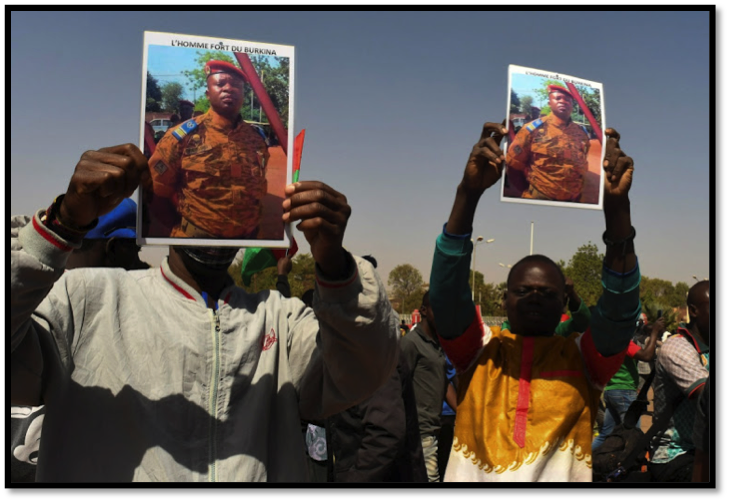
In 2014, protests erupted against his attempt to extend his presidency beyond constitutional limits. Faced with mounting pressure, Compaoré resigned and fled the country, marking the end of his long tenure. The aftermath of Compaoré’s departure saw a transitional period, during which Burkina Faso aimed to navigate a path towards democratic governance.[vii] However, this journey was not without challenges. In September 2015, a faction of the presidential guard staged a coup, attempting to seize power and disrupt the transitional process. The international community condemned the coup, and after days of negotiations and pressure, the coup leaders eventually backed down, allowing for the continuation of the transition.[viii]
Since the 2015 coup attempt, Burkina Faso has faced multiple crises, including a surge in terrorist attacks and insecurity. These challenges have strained the country’s efforts to consolidate democratic governance and achieve sustainable development. The government, alongside regional partners and the international community, has worked to address security concerns while maintaining a focus on economic and social progress. Today, Burkina Faso, led by a transitional government resulting from a putsch, on Thursday, wanted “closer cooperation” with neighbouring Niger where soldiers overthrew the democratically elected president, Mohamed Bazoum, in power since 2021.[ix]
In Burkina Faso, as soon as he came to power in a coup d’etat in September 2022 – the second in eight months – Captain Ibrahim Traoré and his government expressed their desire to diversify their partnerships in the fight against jihadism, by particularly with Russia, after having asked in mid-January for the departure of French troops in the name of “sovereignty”.[x] Bamako has also pushed out the French troops present in Mali since 2013 and has turned to Russia to help it fight these groups, in particular with the presence of Russian instructors who, according to Western countries, are mercenaries from the Wagner paramilitary group. However, like the previous ones there are dirty hands of Western world in these military coups which never leave Africa.[xi]
Conclusion
The legacy of coups in the post-colonial period in Africa is a complex tapestry of challenges, missed opportunities, and lessons learned. While these coups left deep scars, they also catalysed efforts towards more democratic governance, conflict resolution, and sustainable development. The road to stability and progress is ongoing, as African nations continue to strive for a future defined by strong institutions, accountable leadership, and socioeconomic advancement. The history of coups in French colonial countries in Africa serves as a testament to the complex interplay between post-independence aspirations, neo-colonial influences, and domestic power struggles. While coups emerged as a response to deep-seated challenges, their aftermath often led to prolonged instability, hindered development, and delayed progress towards democratic governance. As African nations continue to navigate their paths, the lessons from these historical events underscore the importance of fostering inclusive societies, accountable leadership, and sustainable development to forge a more stable and prosperous future. The series of coups in Burkina Faso’s history reflects a nation grappling with issues of leadership, governance, and the pursuit of socio-economic development. Each coup has left an imprint on the country’s political landscape, shaping its identity, and influencing its trajectory. As Burkina Faso continues to navigate its path, the lessons from its history serve as a reminder of the importance of accountable leadership, social inclusivity, and international cooperation in forging a stable and prosperous future.
Notes
[i] Rabinowitz B. (2018). Coups rivals and the modern state: why rural coalitions matter in sub-Saharan Africa. Cambridge University Press.
[ii] Seely J. C. (2009). The legacies of transition governments in Africa: the cases of Benin and Togo (1st ed.). Palgrave Macmillan.
[iii] Dwyer M. & Molony T. (2019). Social media and politics in Africa: democracy censorship and security. Zed Books.
[iv] Venter A. J. (2014). Portugal’s guerilla wars in Africa: Lisbon’s three wars in Angola Mozambique and Portuguese guinea 1961-74. Helion & Company.
[v] Harkness K. A. (2018). When soldiers rebel: ethnic armies and political instability in Africa. Cambridge University Press.
[vi] Wacker E. Becker U. & Crepaz K. (2019). Refugees and forced migrants in Africa and the eu : comparative and multidisciplinary perspectives on challenges and solutions. Springer.
[vii] Roessler P. G. (2016). Ethnic politics and state power in Africa: the logic of the coup-civil war trap. Cambridge University Press.
[viii] Kalu K. A. (2013). Territoriality citizenship and peacebuilding: perspectives on challenges to peace in Africa. Adonis & Abbey Publishers.
[ix] Carbone G. & Pellegata A. (2020). Political leadership in Africa: leaders and development south of the sahara. Cambridge University Press
[x] Kieh G. K. & Kalu K. A. (2021). Democratization and military coups in Africa: post-1990 political conflicts. Lexington Books.
[xi] Anyangwe C. (2012). Revolutionary overthrow of constitutional orders in Africa. Labngaa Research & Publishg CIG : Distributed by African Books Collective.


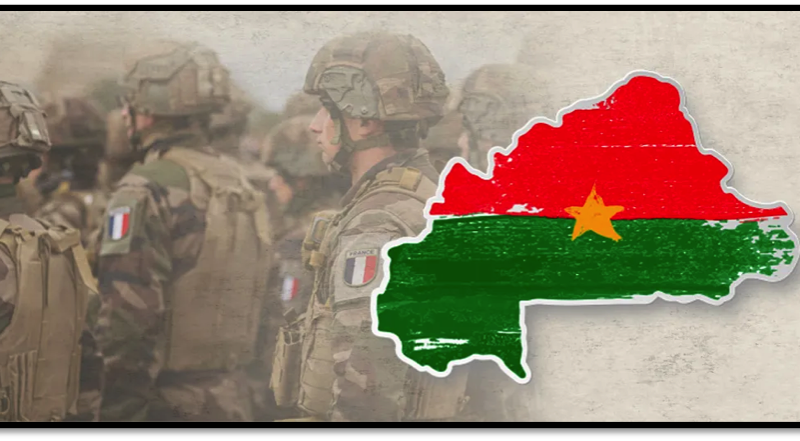
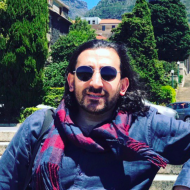
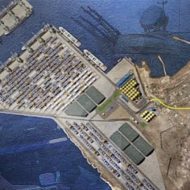

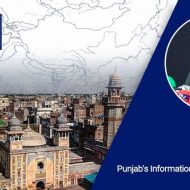


Leave a Reply